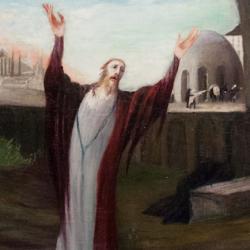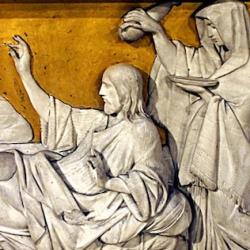John Paul Heil ( The Death and Resurrection of Jesus: A Narrative-Critical Reading of Matthew 26-28 ) offers a close and illuminating reading of Jesus’ trial before Pilate. Pilate’s first question is about Jesus’ kingship, a question that Jesus answers with somewhat puzzling evasiveness. Heil suggests that Jesus answer implies that it is up to Pilate to determine what kind of King He will be: ” You have said it.” Pilate is the king-maker, who “unwittingly play[s] his role in establishing how Jesus is truly ‘the King of the Jews’ precisely by mocking his kingship.”
Jesus remains silent after that, and Pilate concludes that He is innocently charged by envious Jewish leaders. So Pilate attempts to go over the heads of the chief priests and scribes by offering to release either Jesus or Barabbas. No doubt Pilate knows that Jesus is popular with the crowds. Could he have missed a report about Jesus’ entry to Jerusalem only a few days before? Unlikely. Here’s a way to avoid making a decision but also make the right decision of getting Jesus off: Let the people decide.
That forces the hand of the Jewish leaders. They also know that Jesus is popular, and now they have to work the crowd, not just Pilate, to convince them to choose Barabbas. Rather astonishingly, they succeed, and the people demand Barabbas. Perhaps, though, though they succeed too well. When Judas brought back the blood money, the Jewish leaders told Judas to “see to it.” When Pilate tries to slip responsibility, he tells the Jews to “see to it.” Were the Jewish leaders prepared for the response? “His blood on us and our children,” say “all the people” (27:25). The Jewish leaders have been working hard to avoid responsibility, but once they’ve convinced the people the people accept full responsibility. Heil puts this in terms of the blood money: The people are willing to pay the price for Jesus’ death.
He also notes, though, that precisely this acceptance of responsibility gives some hope. The Jewish leaders are determined to kill Jesus, yet accept no responsibility for it. But “The Jewish people’s acceptance of the full responsibility for the price/value of Jesus’ blood ironically places them and all their future generations within the embrace of the forgiveness of sins that the atoning blood of Jesus offers to all.”











